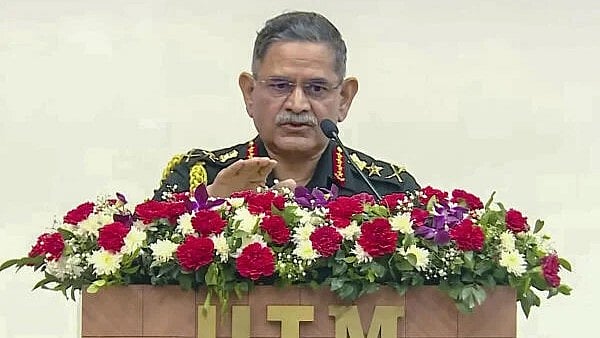
Chief of Army Staff (COAS) General Upendra Dwivedi.
Credit: PTI
New Delhi: Army Chief Gen Upendra Dwivedi on Friday released a book on Operation Sindoor and underlined that it delves into the political clarity, interpretation of "full freedom" which was given to the armed forces, and the setting up of politico-military objectives for the decisive action.
The book, titled 'Operation Sindoor: The Untold Story of India's Deep Strikes Inside Pakistan', has been written by former Army officer and author, Lt Gen KJS Dhillon (retd), and it was launched at the event held at the Manekshaw Centre here.
In his address at the event, Gen Dwivedi, without elaborating, also said, "You may be thinking that on May 10, the war finished; no, because it continued for a long time, because so many decisions were to be taken, and beyond that, of course, it will be difficult for me to share here."
India launched Operation Sindoor early on May 7, under which the armed forces decimated multiple terror infrastructure in Pakistan and Pakistan-occupied-Kashmir, in retaliation for the deadly Pahalgam attack on April 22.
India later announced that its military action was focused, measured and non-escalatory.
Pakistani forces retaliated with offensives and Indian forces also launched counter-offensives under Operation Sindoor, as a result the conflict went on for nearly four days. After the two sides reached an understanding, the military action was stopped in the evening of May 10.
This book is not just a narrative of a military operation, but a tribute to the "courage, professionalism and unyielding spirit" of the Indian Army and the nation it serves, the Army chief said in his address.
Gen Dwivedi said the author has tried to cover in the book, aspects "which generally remains unheard, untold, because the uniformed people cannot speak about it".
The Army chief said he was really grateful to Lt Gen Dhillon (retd) for carrying out this "onerous task".
"And, what is rightly brought out, as far as the Line of Control battle is concerned, we got so much used to this kind of a battle that we don't realise the relevance, the emotions, the losses, the gains and the challenges which are there," Gen Dwivedi said.
So, in Operation Sindoor, this was something which was "an untold story".
"And, as you are aware that by mistake when the list came out from the opposite side that how many are being given posthumous awards, I can say that most of the credit should go to the Line of Control," the Army chief said.
He was referring to recent reports about a group of Pakistani soldiers who were to be awarded posthumously.
"So, that is how it began. To the extent that when we caught some kind of a small excerpt, it said, 'bahut hua, file chhoro, jaldi se Muzaffarabad bhago'. So, that was the kind of onslaught which took place, the fire assault which was there," the Army chief said, without elaborating.
He said this book covers the aspects related to the military operation in a completely lucid manner.
"The book is factful and it's transcending from the supra-strategic to the tactical, it's very difficult. In one small book, covering all these aspects, it's a real challenge. But, he's been able to put everything together," he added.
Gen Dwivedi said the book delves into the "political clarity, interpretation of full freedom which was given to us, setting up of politico-military objectives, and glimpses of three issues which forces always look at -- force visualisation, force protection and force application".
Then he also delves into centralised planning and decentralised execution, which is very different to strike a balance with, the Army chief said.
Because, every force has its own ways, and grey zone makes it "more challenging".
"And, the most important is the synergised orchestration of the three forces. It also meanders through the so-called grey zone which, I, at IIT-Madras (event recently) had called it playing of a game of chess, or a wide river with a dense fog, which entails decision dilemma at every stage, i.e., starting from April 23 till May 16," the Army chief underlined.
So, when to start, when to stop, how much to apply in terms of time, space and resources, and how much, what is the definition of calibrated action, all these things were something "we kept discussing at every time," Gen Dwivedi recalled.
Operation Sindoor has now become an emphatic symbol of India's new normal against terrorism, including cross-border terrorism.
"Indian announced its resolve with a new normal, with outstanding clarity in strategic guidance, with a whole-of-nation approach for execution," the Army chief asserted in his address.
So every action, every inaction -- meaning deliberately not taking an action, had long-term implications, the Army chief recalled.
"But, I must say, the Indian Army during this complete thing, moved something like a rhythmic wave," he said.
"When I say rhythmic wave, in these 88 hours, it was not possible for you to come for the planning, pass the orders... so, everybody was synergised, and everybody knew his orders," Gen Dwivedi said.
It will also be a kind of an "introspection for narrative management system", and lessons for the media, whether the media was correct in the hype, he said.